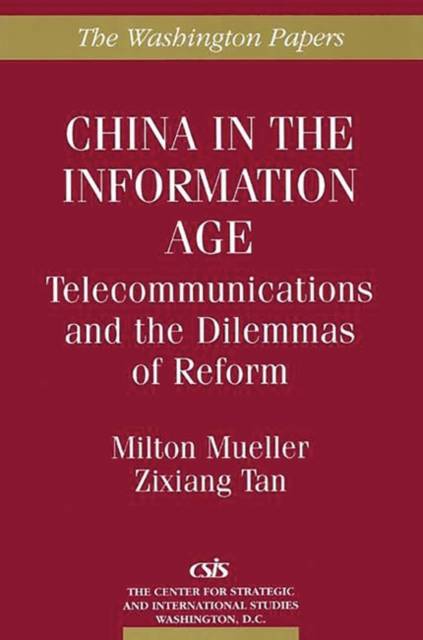
Je cadeautjes zeker op tijd in huis hebben voor de feestdagen? Kom langs in onze winkels en vind het perfecte geschenk!
- Afhalen na 1 uur in een winkel met voorraad
- Gratis thuislevering in België vanaf € 30
- Ruim aanbod met 7 miljoen producten
Je cadeautjes zeker op tijd in huis hebben voor de feestdagen? Kom langs in onze winkels en vind het perfecte geschenk!
- Afhalen na 1 uur in een winkel met voorraad
- Gratis thuislevering in België vanaf € 30
- Ruim aanbod met 7 miljoen producten
Zoeken
China in the Information Age
Telecommunications and the Dilemmas of Reform
Zixiang Tan, Milton Mueller
€ 161,45
+ 322 punten
Uitvoering
Omschrijving
China's economic and social progress toward modernization is one of the defining features of the last quarter of the 20th century. The emergence of China coincides with another development of equally important international implications--the revolution in information and telecommunication technology. But how compatible are the new China and the information age? The Chinese government intends to embrace market-oriented economic development while maintaining centralized control over politics, culture, and public discourse. The contradictions and tensions of this goal are especially acute in telecommunication and information technology markets, where the rest of the world is moving rapidly toward liberalization and globalization. Will China's economic reforms allow it to join the information revolution, or will its unique political structure keep it insulated from the main currents of global economic development? This volume is the first detailed examination of how China's reform process is playing out in the realm of information and telecommunications.
Specificaties
Betrokkenen
- Auteur(s):
- Uitgeverij:
Inhoud
- Aantal bladzijden:
- 184
- Taal:
- Engels
- Reeks:
Eigenschappen
- Productcode (EAN):
- 9780275958282
- Verschijningsdatum:
- 30/12/1996
- Uitvoering:
- Hardcover
- Formaat:
- Genaaid
- Afmetingen:
- 156 mm x 234 mm
- Gewicht:
- 430 g

Alleen bij Standaard Boekhandel
+ 322 punten op je klantenkaart van Standaard Boekhandel
Beoordelingen
We publiceren alleen reviews die voldoen aan de voorwaarden voor reviews. Bekijk onze voorwaarden voor reviews.









